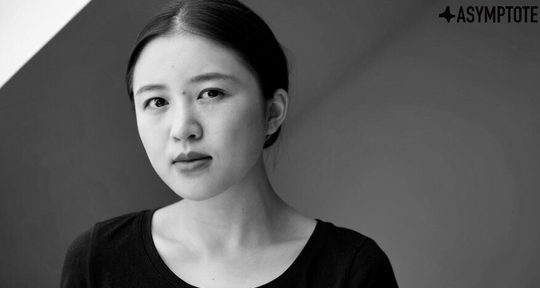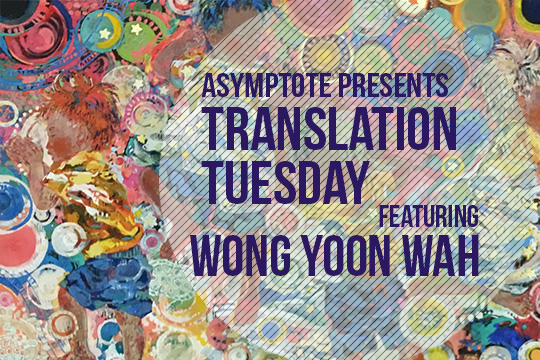This week’s Translation Tuesday proffers a poem by Chinese poet Song Lin. This poem, “Untitled,” translated with a certain sublimity by Dong Li, offers a haunting vision that places the reader into a fleeting and gilded world, where the symbols of poetry invert and exhaust themselves upon being observed. Within this short poem, a whole lifetime quivers under the strain of thought and composition. “A belated meeting beckons” to the readers of the poem who become themselves the poetic voice, simultaneously offered and denied the splendor of traditional lyric. Dong Li’s translation captures the sparsity of language and the depth of tableau expected of traditional Chinese lyric poetry, while also capturing a sense of alienation from these stereotypical themes and imagery. The language of this poem leaves a lasting impression as it ignites and etches feelings and impressions. We are glad to be able to feature this innovative and compelling translation.
Posts filed under 'Chinese Poetry'
Translation Tuesday: “Untitled” by Song Lin

your evening battles with a certain angel / until stars become bones
On Yu Yoyo, Language, and the Unsayable

from solitude I try to excavate / the human / but what I pull off are hairs from the haunches / of an animal
Poetry is a never-ending lesson in precision. The distillation of thirst, the evocation of experience, the cauterization of an open wound. Between the poets of the world and their various works there is a common acknowledgement of restraint—there is only so much we can do with words, and only so much words can mean. Claude Lévi-Strauss originated the term “floating signifier” to describe language that has only vague or contextual denotation, and in our contact with literature we gradually come to understand that such abstraction is the enemy of poetry. So we step gingerly around the words we know contain too much to unpack. Words like “hurt,” or “death,” or “love.”
Floating signifiers are especially insecure in translation, in which one often has to choose between music and intention, double meanings or single ones, visual effect or faithful retellings. They present a particular dilemma because a floating signifier in one language may not be one in the other. The Chinese language, painting with a full palette of the pictorial, the symbolic, the historical, and the literal, has a tangibility that does not lapse into the vague as easily as English does. Ernest Fenollosa, in his (flawed but admirable) studies, characterized Chinese characters as a medium for poetry. It is not that Chinese is inherently more possessive of the elusive idea of poetics, but rather that the facets of Chinese language that enchanted Fenollosa with their invocation of poetry are also what result in headaches for translators. We do not count our losses in translation. Instead, we admire the growth a poem may undergo as it leaves its writer’s hand and wanders onto the page, how it may cross oceans and national borders, how it lives, how it is alive, the way we know language to be.
Translation Tuesday: “Shadow Puppets” by Wong Yoon Wah

With a dab of paint I become the singing, dancing doll everyone loves.
The stories told with Southeast Asia’s shadow puppets, better known in the region as ‘Wayang Kulit’, range from adaptations of ancient epics to familiar, domestic sagas. This poem was written in 1977, when the Malayan-born Wong Yoon Wah (by then an outspoken scholar, critic, and award-winning writer) was appointed Director of the Institute of Humanities and Social Sciences at Nanyang University—just as higher education in Singapore was experiencing a period of upheaval. In this poem, Wong holds his own multiple identities up to the light, and a candid sense of his inner self shines through.
i. Birth
A sharp knife
pares the leather into shape.
A ruthless awl
carves each nub of my character.
With a dab of paint
I become the singing, dancing doll
everyone loves.
ii. Family Background
Though I’m a shadow
acting in the night’s mystery,
I am a child of light,
nothing without its beam.
The village’s earth is a white gauze.
In this soiled world, I can’t find myself.
I’ve never left a footprint
on the path.
I sing movingly
but never with my own voice.
At home, I’m a shadow on the screen.
On stage: a self you can see.
iii. Confession
Don’t take me
for one who loves fights,
schemes to be king,
or hankers
after Solomon’s princesses.
A shapeless thread holds each of my four limbs.
Being superstitious, I can’t refuse being fate’s plaything.
The old man backstage
has my voice in his hands.
Whether I’m crying or laughing,
he decides.
iv. Fate
If you go backstage
when the show ends,
you’ll find us—heroes, ladies—all
in the arms of the ugly puppeteer.
After we’ve been played,
our heads are taken down,
bodies folded and stacked again
in his box, secured with string
where patiently, like prisoners,
we’ll wait to see the sun.
November, 1977
Translated from the Chinese by Theophilus Kwek
Born in Malaysia, Professor Wong Yoon Wah has won Singapore’s Cultural Medallion (1986), Thailand’s South-East Asia Write Award (1984), and the ASEAN Cultural Award (1993). He has published more than twenty books as well as over fifty articles on modern and postcolonial Chinese literature, and is presently Senior Vice President of Southern University College, Malaysia.
Theophilus Kwek has published three collections of poetry, most recently Giving Ground (2016). He won the Jane Martin Prize in 2015 and the New Poets’ Prize in 2016, and his translation of ‘Moving House’ by Wong Yoon Wah placed second in this year’s Stephen Spender Prize for Poetry in Translation.
*****
Read More Translations:
